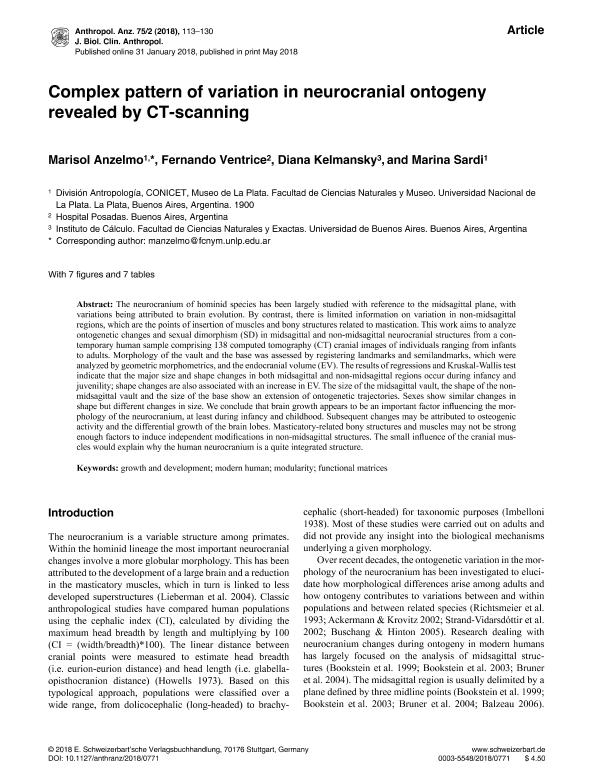Mostrar el registro sencillo del ítem
dc.contributor.author
Anzelmo, Marisol

dc.contributor.author
Ventrice, Fernando

dc.contributor.author
Kelmansky, Diana Mabel

dc.contributor.author
Sardi, Marina Laura

dc.date.available
2020-01-14T19:42:08Z
dc.date.issued
2018-01
dc.identifier.citation
Anzelmo, Marisol; Ventrice, Fernando; Kelmansky, Diana Mabel; Sardi, Marina Laura; Complex pattern of variation in neurocranial ontogeny revealed by CT-scanning; E Schweizerbartsche Verlags; Anthropologischer Anzeiger; 75; 2; 1-2018; 113-130
dc.identifier.issn
0003-5548
dc.identifier.uri
http://hdl.handle.net/11336/94668
dc.description.abstract
The neurocranium of hominid species has been largely studied with reference to the midsagittal plane, with variations being attributed to brain evolution. By contrast, there is limited information on variation in non-midsagittal regions, which are the points of insertion of muscles and bony structures related to mastication. This work aims to analyze ontogenetic changes and sexual dimorphism (SD) in midsagittal and non-midsagittal neurocranial structures from a contemporary human sample comprising 138 computed tomography (CT) cranial images of individuals ranging from infants to adults. Morphology of the vault and the base was assessed by registering landmarks and semilandmarks, which were analyzed by geometric morphometrics, and the endocranial volume (EV). The results of regressions and Kruskal-Wallis test indicate that the major size and shape changes in both midsagittal and non-midsagittal regions occur during infancy and juvenility; shape changes are also associated with an increase in EV. The size of the midsagittal vault, the shape of the non-midsagittal vault and the size of the base show an extension of ontogenetic trajectories. Sexes show similar changes in shape but different changes in size. We conclude that brain growth appears to be an important factor influencing the morphology of the neurocranium, at least during infancy and childhood. Subsequent changes may be attributed to osteogenic activity and the differential growth of the brain lobes. Masticatory-related bony structures and muscles may not be strong enough factors to induce independent modifications in non-midsagittal structures. The small influence of the cranial muscles would explain why the human neurocranium is a quite integrated structure.
dc.format
application/pdf
dc.language.iso
eng
dc.publisher
E Schweizerbartsche Verlags

dc.rights
info:eu-repo/semantics/openAccess
dc.rights.uri
https://creativecommons.org/licenses/by-nc-sa/2.5/ar/
dc.subject
DEVELOPMENT
dc.subject
FUNCTIONAL MATRICES
dc.subject
GROWTH
dc.subject
MODERN HUMAN
dc.subject
MODULARITY
dc.subject.classification
Otras Humanidades

dc.subject.classification
Otras Humanidades

dc.subject.classification
HUMANIDADES

dc.title
Complex pattern of variation in neurocranial ontogeny revealed by CT-scanning
dc.type
info:eu-repo/semantics/article
dc.type
info:ar-repo/semantics/artículo
dc.type
info:eu-repo/semantics/publishedVersion
dc.date.updated
2019-10-23T21:34:36Z
dc.identifier.eissn
2363-7099
dc.journal.volume
75
dc.journal.number
2
dc.journal.pagination
113-130
dc.journal.pais
Alemania

dc.description.fil
Fil: Anzelmo, Marisol. Universidad Nacional de La Plata. Facultad de Cienicas Naturales y Museo. División Antropología; Argentina
dc.description.fil
Fil: Ventrice, Fernando. Hospital Nacional Professor Dr. Alejandro Posadas; Argentina
dc.description.fil
Fil: Kelmansky, Diana Mabel. Universidad de Buenos Aires. Facultad de Ciencias Exactas y Naturales. Instituto de Cálculo; Argentina
dc.description.fil
Fil: Sardi, Marina Laura. Universidad Nacional de La Plata. Facultad de Cienicas Naturales y Museo. División Antropología; Argentina
dc.journal.title
Anthropologischer Anzeiger
dc.relation.alternativeid
info:eu-repo/semantics/altIdentifier/doi/http://dx.doi.org/10.1127/anthranz/2018/0771
dc.relation.alternativeid
info:eu-repo/semantics/altIdentifier/url/https://www.schweizerbart.de/papers/anthranz/detail/75/88519/Complex_pattern_of_variation_in_neurocranial_ontog?af=crossref
Archivos asociados
